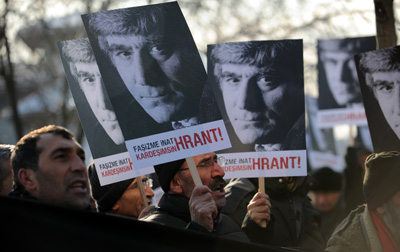New York, January 17, 2012–The conviction of several accomplices in the 2007 assassination of Hrant Dink, then-editor of the Turkish-Armenian weekly Agos, fails to address the issue of who commissioned the slaying, thus perpetuating impunity in the case, the Committee to Protect Journalists said today.
Dink, 52, was shot to death outside his newspaper’s offices five years ago this week. A Turkish citizen of Armenian ethnicity, the journalist was known for his outspoken pieces on the contentious issue of the 1915 Armenian massacre, which he had characterized as genocide. Dink had reported receiving threats from radical nationalists before he was killed, CPJ research shows.
Local media reported today that the 14th Court of Serious Crimes of Beşiktaş Courthouse in İstanbul declared Turkish national Yasin Hayal to be an accomplice in the murder and guilty of inciting the gunman, Ogun Samast, to kill Dink in retaliation for his views. The court handed Hayal a life sentence without possibility of parole, news reports said.
Three other accomplices, all radical nationalists, were also handed prison terms today–Ersin Yolcu was sentenced to 12 years and 6 months for instigating murder; Ahmet İskender to 12 years and 6 months for instigating the murder and owning a gun without a license; and Salih Hacısalihoğlu to 10 weeks for illegal possession of bullets, news reports said.
Dink’s family, colleagues, and supporters have repeatedly called for the prosecution of security and military officials with radical nationalist sympathies whom they suspect of ordering the editor’s killing in retaliation for his work. Dink was subjected to death threats, hate mail, and politicized prosecution for “insulting Turkishness” in retaliation for his controversial writings on the plight of ethnic Armenians during World War I. In a July interview, Dink’s successor at the newspaper, Rober Koptaş, told CPJ: “We know there is evidence that a lot of police and soldiers are involved in the assassination [of Hrant Dink]. … [But] there is no real investigation about state officials, whether civilian or military.”
In reaction to today’s verdict, Dink’s family lawyer Fethiye Çetin told the Turkish press that the family will continue to press for justice. “It is not over–this trial is just beginning,” she said. Friends and supporters are planning a gathering on January 19, the fifth anniversary of Dink’s slaying, to demand the end of impunity.
“Justice for our colleague Hrant Dink will not be achieved until the commissioners of his slaying five years ago are tried and punished to the full extent of the law,” CPJ Europe and Central Asia Program Coordinator Nina Ognianova said. “We stand in solidarity with Dink’s family, colleagues, and friends in calling for a thorough and transparent investigation into the suspected involvement of military and security service officials in this brutal crime.”
Since the court proceedings began nearly five years ago, at least 19 individuals have been prosecuted for having various degrees of involvement in Dink’s murder, CPJ research shows. Today’s verdict–two days before the fifth anniversary of the journalist’s assassination–resulted in the convictions of only secondary accomplices and failed to address the pivotal question of who masterminded the crime.
In July, a juvenile court sentenced Samast, a teenager at the time of the killing, to about 23 years in prison for committing the crime, news reports said. In June, a court in the Black Sea province of Trabzon convicted six military officers of having had information on the murder but failing to prevent the killing, according to news reports. The officials were handed months-long prison terms, which they have appealed, and they were not incarcerated. The masterminds of the murder were never prosecuted, CPJ research shows.
[Editor’s Note: The fourth paragraph was updated to correct the length of İskender’s sentence to 12 years and 6 months.]
